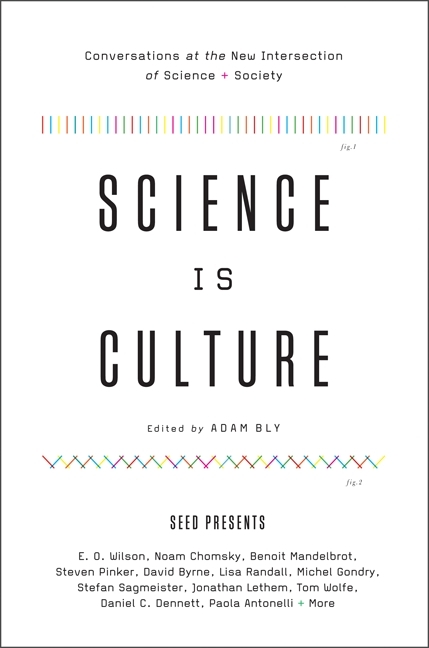2. SCIENCE IS CULTURE
In 2001, Adam Bly founded Seed Magazine with the vision of exploring the social, creative, intellectual, economic, and political transformations underpinned by science. One of the magazine's most beloved features has been the Seed Salon, pairing a scientist and artist, humanist, or other non-scientist in a conversation about issues of common interest and shared significance. In 2010, Bly collected 12 of these conversations inScience Is Culture: Conversations at the New Intersection of Science + Society -- a who's who of contemporary art, science, literature, and philosophy, methodically and thoughtfully bridging the age-old yet, as these conversations prove, artificial divide between science and culture. These tête-à-têtes include momentous pairings like David Byrne + Daniel Levitin, Benoit Mandelbrot + Paola Antonelli, E.O Wilson + Daniel Dennett, and Jonathan Lethem + Janna Levin. (It's also worth nothing that of the seven books in this omnibus, this one is by far the most gender-balanced in perspectives and representation -- something that would be commendable were it not for the tragic admission of male-centricity still being the norm implicit to such commendation.)
Here's a taste from the salon conversation between author Alan Lightman and choreographer Richard Colton, who discuss the relationship between art and time:
Alan Lightman: "If I had a few hours or longer, I could work on a writing project. If I had half an hour, I could do errands or pay bills. If I only had two or three minutes, I could answer telephone messages. I realized that I had carved up the entire day into five-minute units of efficiency, and I was appalled. I was very upset to think that i was becoming a robot -- and I'm wondering, how do you use time in your life?
Richard Colton: One of the things that came to mind when you told this story is something I remember reading during the Gertrude Stein phase, which is that Stein believed the first ingredient for creativity was boredom. You must trust that the mundane will lead to something interesting.
John Cage also taught that if you let the duration of a movement or musical phrase just keep going, it will almost always become more interesting, which is the exact opposite of carving something up into small increments. You will go through a period where the music seems boring, but if you let it keep going it can become quite interesting."
http://www.theatlantic.com/life/archive/2011/10/on-wisdom-love-and-optimism-7-essential-interview-anthologies/246488/


No comments:
Post a Comment